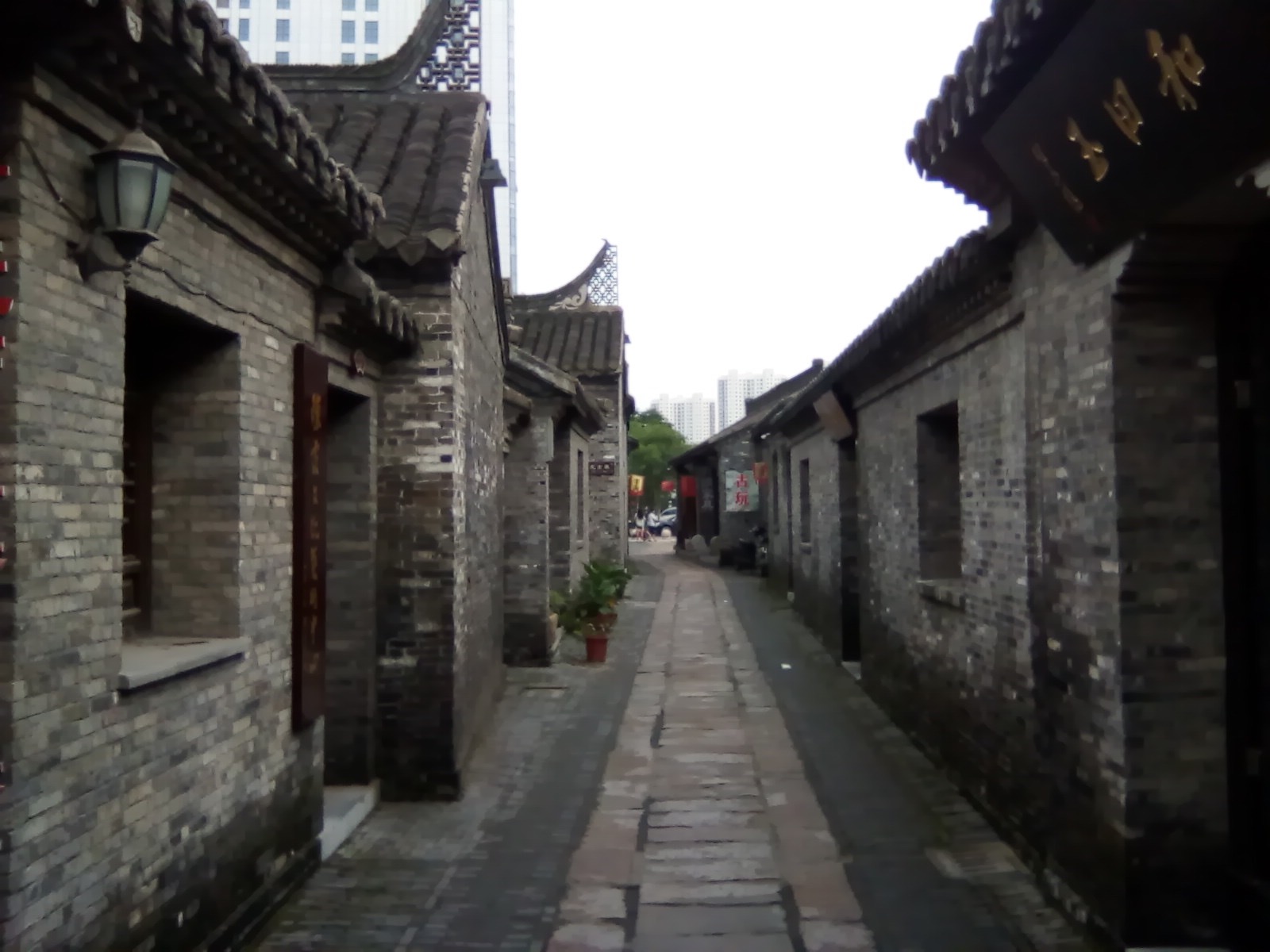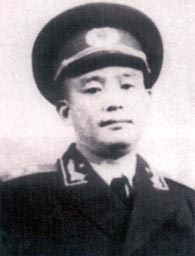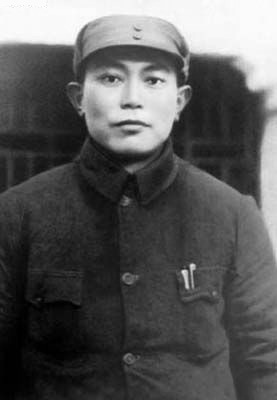|
Gu Mu
Gu Mu (; September 1914 – November 6, 2009) was a Chinese revolutionary figure and politician, who served as the Vice-Premier of the People's Republic of China between 1975 and 1982. As one of Deng Xiaoping's main aides in charge of economic management, he played a major role in implementing Deng's economic reform policies of the 1980s. He was a key figure in the creation of Shenzhen, China's first Special Economic Zone. Early life and career Gu Mu was born in September 1914 in a village in Rongcheng, Shandong. His birth name was Liu Jiayu (). Although his parents were poor peasants, he received a good education at the insistence of his grandfather. He joined the Communist Party in July 1932 and became involved in revolutionary activities in Wendeng County, where he was attending school. He changed his name to "Gu Mu" to avoid implicating his family. In 1934, Gu went to Beijing (then known as Beiping) and became a leader of the Beiping branch of the League of Left-Wing Write ... [...More Info...] [...Related Items...] OR: [Wikipedia] [Google] [Baidu] |
Vice Premier Of The People's Republic Of China
The vice premiers of the State Council of the People's Republic of China () are high-ranking officials under the premier and above the state councillors and ministers. Generally, the title is held by multiple individuals at any given time, with each vice-premier holding a broad portfolio of responsibilities. The first vice-premier takes over duties of the premier at the time of the latter's incapacity. The incumbent vice premiers, in order of rank, are Han Zheng, Sun Chunlan, Hu Chunhua and Liu He. The highest-ranked office holder is informally called the Senior Vice Premier or First Vice Premier () or Executive Vice Premier (), a most prominent case being Deng Xiaoping in the mid-to-late 1970s. In irregular instances, the position of a senior vice premier has been named either to indicate degree of power, nominal power, or when the premier is incapacitated and requires a full-time deputy to carry out his regular duties. Current vice-premiers List of vice-premiers ... [...More Info...] [...Related Items...] OR: [Wikipedia] [Google] [Baidu] |
Jinan
Jinan (), Postal Map Romanization, alternately romanization of Chinese, romanized as Tsinan, is the Capital (political), capital of Shandong province in East China, Eastern China. With a population of 9.2 million, it is the second-largest city in Shandong. The area of present-day Jinan has played an important role in the history of the region from the earliest beginnings of civilization and has evolved into a major national administrative, economic, and transportation hub. The city has held Sub-provincial city, sub-provincial administrative status since 1994. Jinan is often called the "City of Springs" for its famous 72 Artesian aquifer, artesian springs. Jinan is one of the top List of cities by scientific output, 40 cities in the world for scientific research as tracked by the Nature Index according to the Nature Index 2022 Science Cities. The city is home to List of universities and colleges in Shandong, several major universities, including Shandong University, Shangdong, Sha ... [...More Info...] [...Related Items...] OR: [Wikipedia] [Google] [Baidu] |
People's Liberation Army
The People's Liberation Army (PLA) is the principal military force of the People's Republic of China and the armed wing of the Chinese Communist Party (CCP). The PLA consists of five service branches: the Ground Force, Navy, Air Force, Rocket Force, and Strategic Support Force. It is under the leadership of the Central Military Commission (CMC) with its chairman as commander-in-chief. The PLA can trace its origins during the Republican Era to the left-wing units of the National Revolutionary Army (NRA) of the Kuomintang (KMT) when they broke away on 1 August 1927 in an uprising against the nationalist government as the Chinese Red Army before being reintegrated into the NRA as units of New Fourth Army and Eighth Route Army during the Second Sino-Japanese War. The two NRA communist units were reconstituted into the PLA on 10 October 1947. Today, the majority of military units around the country are assigned to one of five theater commands by geographical locat ... [...More Info...] [...Related Items...] OR: [Wikipedia] [Google] [Baidu] |
Jiang Zemin
Jiang Zemin (17 August 1926 – 30 November 2022) was a Chinese politician who served as general secretary of the Chinese Communist Party (CCP) from 1989 to 2002, as chairman of the Central Military Commission from 1989 to 2004, and as president of China from 1993 to 2003. Jiang was paramount leader of China from 1989 to 2002. He was the core leader of the third generation of Chinese leadership, one of only four core leaders alongside Mao Zedong, Deng Xiaoping and Xi Jinping. Jiang Zemin came to power unexpectedly as a compromise candidate following the 1989 Tiananmen Square protests and massacre, when he replaced Zhao Ziyang as CCP general secretary after Zhao was ousted for his support for the student movement. At the time, Jiang had been the party leader of the city of Shanghai. As the involvement of the " Eight Elders" in Chinese politics steadily declined, Jiang consolidated his hold on power to become the "paramount leader" in the country during the 1990s. Urged ... [...More Info...] [...Related Items...] OR: [Wikipedia] [Google] [Baidu] |
Hu Jintao
Hu Jintao (born 21 December 1942) is a Chinese politician who served as the 16–17th general secretary of the Chinese Communist Party (CCP) from 2002 to 2012, the 6th president of the People's Republic of China (PRC) from 2003 to 2013, and chairman of the Central Military Commission (CMC) from 2004 to 2012. He was a member of the CCP Politburo Standing Committee, China's ''de facto'' top decision-making body, from 1992 to 2012. Hu was the paramount leader of China from 2002 to 2012. Hu rose to power through the Chinese Communist Party (CCP), notably as Party Committee secretary for Guizhou province and the Tibet Autonomous Region, where his harsh repression of dissent gained him attention from the highest levels. He moved up to first secretary of the CCP Central Secretariat and vice president under CCP general secretary Jiang Zemin. Hu was the first leader of the Communist Party from a generation younger than those who participated in the civil war and the foundin ... [...More Info...] [...Related Items...] OR: [Wikipedia] [Google] [Baidu] |
Chinese People's Political Consultative Conference
The Chinese People's Political Consultative Conference (CPPCC, zh, 中国人民政治协商会议), also known as the People's PCC (, ) or simply the PCC (), is a political advisory body in the People's Republic of China and a central part of the Chinese Communist Party (CCP)'s United Front system. Its members advise and put proposals for political and social issues to government bodies. However, the CPPCC is a body without real legislative power. While consultation does take place, it is supervised and directed by the CCP. The body traditionally consists of delegates from the CCP and its front organizations, eight legally-permitted political parties subservient to the CCP, as well as nominally independent members. The CPPCC is chaired by a member of the Politburo Standing Committee of the Chinese Communist Party. In keeping with the United Front strategy, prominent non-CCP members have been included among the Vice Chairs, examples being Chen Shutong, Li Jishen and Soon ... [...More Info...] [...Related Items...] OR: [Wikipedia] [Google] [Baidu] |
State Council Of The People's Republic Of China
The State Council, constitutionally synonymous with the Central People's Government since 1954 (particularly in relation to local governments), is the chief administrative authority of the People's Republic of China. It is chaired by the premier and includes each cabinet-level executive department's executive chief. Currently, the council has 35 members: the premier, one executive vice premier, three other vice premiers, five state councilors (of whom three are also ministers and one is also the secretary-general), and 26 in charge of the Council's constituent departments. The State Council directly oversees provincial-level People's Governments, and in practice maintains membership with the top levels of the CCP. Aside from very few non-CCP ministers, members of the State Council are also members of the CCP's Central Committee. Organization The State Council meets every six months. Between meetings it is guided by a (Executive Meeting) that meets weekly. The standin ... [...More Info...] [...Related Items...] OR: [Wikipedia] [Google] [Baidu] |
State Development And Planning Commission
The National Development and Reform Commission of the People's Republic of China (NDRC), formerly State Planning Commission and State Development Planning Commission, is a macroeconomic management agency under the State Council, which has broad administrative and planning control over the economy of Mainland China. It has reputation of being the "mini-state council". The candidate for the chairperson of the NDRC is nominated by the Premier of the People's Republic of China and approved by the National People's Congress. Since February 2017 the commission has been headed by He Lifeng. Synopsis The NDRC's functions are to study and formulate policies for economic and social development, maintain the balance of economic development, and to guide restructuring of the economic system of Mainland China. The NDRC has twenty-six functional departments/bureaus/offices with an authorized staff size of 890 civil servants. Prior to 2018, it was also responsible for enforcing China's ... [...More Info...] [...Related Items...] OR: [Wikipedia] [Google] [Baidu] |
Yu Qiuli
Yu Qiuli (; 15 November 1914 – 3 February 1999) was a Chinese Communist army officer and politician, general of the People's Liberation Army. A veteran of the Long March, he held top military and government positions under both Mao Zedong and Deng Xiaoping and is considered the founding father of the Chinese petroleum industry and the China National Petroleum Corporation.中国人民解放军《中国人民解放军高级将领传》编审委员会,中国中共党史人物研究会《中国人民解放军高级将领传》编撰委员会编. 中国人民解放军高级将领传 第24卷. 北京: 解放军出版社. 2013: 241–322. . Following military service as a senior commander and political commissar in the Second Sino–Japanese War and the Chinese Civil War, Yu then served as Minister of the Petroleum Industry (1958–1966), Chairman of the State Planning Commission (1970–1980), Vice Premier (1975–1982), and Deputy Secretary-General of the Central Military Commi ... [...More Info...] [...Related Items...] OR: [Wikipedia] [Google] [Baidu] |
Li Xiannian
Li Xiannian (pronounced ; 23 June 1909 – 21 June 1992) was a Chinese Communist military and political leader, President of the People's Republic of China (''de jure'' head of state) from 1983 to 1988 under Paramount Leader Deng Xiaoping and then Chairman of the Chinese People's Political Consultative Conference from 1988 until his death. He was a full member of the Politburo from 1956 to 1987, and of its Standing Committee from 1977 to 1987.''Li Xiannian (1909–1992)'', in Christopher R. Lew, Edwin Pak-wah Leung: ''Historical Dictionary of the Chinese Civil War'', p.p. 120-121, Scarecrow Press, 2013Holley, David"Li Xiannian, Ex-President of China, Dies at 83: Old Guard: He was one of a ruling clique of ‘8 elders’ who ordered the army to repress the pro-democracy movement in 1989".''Los Angeles Times'', 23 June 1992. Li worked as an apprentice carpenter in his teenage years to support his family. He joined the Communist Party in December 1927 and became a soldier in ... [...More Info...] [...Related Items...] OR: [Wikipedia] [Google] [Baidu] |
Cultural Revolution
The Cultural Revolution, formally known as the Great Proletarian Cultural Revolution, was a sociopolitical movement in the People's Republic of China (PRC) launched by Mao Zedong in 1966, and lasting until his death in 1976. Its stated goal was to preserve Chinese communism by purging remnants of capitalist and traditional elements from Chinese society. The Revolution marked the effective commanding return of Mao –who was still the Chairman of the Chinese Communist Party (CCP)– to the centre of power, after a period of self-abstention and ceding to less radical leadership in the aftermath of the Mao-led Great Leap Forward debacle and the Great Chinese Famine (1959–1961). The Revolution failed to achieve its main goals. Launching the movement in May 1966 with the help of the Cultural Revolution Group, Mao charged that bourgeois elements had infiltrated the government and society with the aim of restoring capitalism. Mao called on young people to " bombard the hea ... [...More Info...] [...Related Items...] OR: [Wikipedia] [Google] [Baidu] |




.jpg)


.jpg)